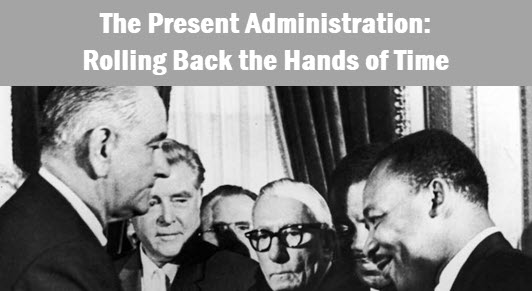Fight For Social Security Is Part of a Larger Racial Agenda
April 13, 2025 8:20 am | 3 min read

Photo via Sixth Circuit upon the signing of the 1965
Voting Rights Act | Columbia
County Observer graphic
As millions of retirees, people with disabilities, and other beneficiaries try to cope with DOGE impacts on Social Security (website outages, inordinate phone and in-person wait times, complete non-service for many), one group stands particularly vulnerable.
"Either America will be a multiracial democracy, or it will not be a democracy at all."
Because of long-standing wealth gaps stemming from discrimination in housing, mortgage lending, and employment, many retired African Americans rely on Social Security as their principal source of income. Their access to other assets in retirement (workplace retirement plans, job-based pensions, home ownership, inheritance) is significantly more limited than that of white Americans. As a result, hindrances to continuous coverage can have serious consequences for people struggling to meet basic needs in nutrition, housing, and health.
Yet the present crisis in Social Security can only be understood as part of a larger narrative: the halting, uneven progress toward a multiracial democracy, and the current, accelerating efforts to erase that progress completely. When Congress passed the Social Security Act in 1935, Southern politicians played a significant role in helping deny coverage to 65 percent of African Americans. They did so by pushing for an exemption for agricultural laborers and domestic workers, two groups comprising a disproportionate number of African Americans.
The Laws
It took 15 years for Congress to rectify that inequity through amendments to the original Social Security Act, and the decades that followed added new milestones marking the country’s progress toward a greater measure of racial equality.
The Civil Rights Act of 1964 banned discrimination in employment and public places, and the Voting Rights Act of 1965 removed Jim Crow-era restrictions on voting, allowing for vast increases in the number of African Americans able to vote freely in the South.
In the area of healthcare, the passage of the Affordable Care Act (ACA) almost a half-century later significantly expanded access to healthcare marketplaces and to Medicaid for millions of Americans, helping diminish (if not eradicate) long-standing racial inequities in access to care.
The Pushback
Advances also catalyzed fierce pushback. In 2013, with Chief Justice John Roberts presiding, the Supreme Court issued a ruling in Shelby County v Holder that eviscerated a key provision of the 1965 Voting Rights Act. In the following years, Congressional Republicans blocked passage of legislation, including the John R. Lewis Voting Rights Advancement Act, that would strengthen the voting rights protections of the 1965 Act.
Healthcare had a target on its back. Donald Trump promised to repeal the Affordable Care Act in his first term, but he failed. Nevertheless, the current Republican-controlled Congress is seriously considering major cuts to Medicaid, the nation’s largest single source of health coverage, serving primarily low-income Americans. They are doing so to help fund permanent tax cuts that will benefit the wealthiest Americans.
Words and Phrases Are Disappearing
To advance its agenda, the Trump administration has identified words and phrases that government agencies should limit or avoid – words like "disability," "discrimination," "health equity," "mental health," "pregnant person," and "women." The administration assumes that erasing or limiting the use of these words can somehow erase people's consciousness of the realities they represent.
As long as truth-tellers of any kind continue to do their work, facts and realities will refuse to be “disappeared,” like the fact that infant mortality is significantly higher in Black families than it is in white.
In their landmark study of America’s counter-majoritarian political institutions (“Tyranny of the Minority”), political scientists Steven Levitsky and Daniel Ziblatt define a multiracial democracy as “a political system with regular, free, and fair elections in which adult citizens of all ethnic groups possess the right to vote and basic civil liberties such as freedom of speech, the press, assembly, and association.” Though Levitsky and Ziblatt refer specifically to political rights and freedoms, a multiracial democracy must also guarantee such social rights and freedoms as the freedom from want and the right to quality health care.
Americans Are Standing Up
In signs and speeches, hundreds of thousands of Americans protesting in the ongoing “Hands Off” rallies have made clear what they won’t accept: oligarchy, authoritarianism, the enriching of the super-wealthy at the expense of everyone else. As the pressure and strength of the protests continue to grow, perhaps coalescing into a broad coalition of organizations, institutions, and individuals, it’s more important than ever to bring greater clarity to the core issue of racial equality and to the larger narrative at stake.
Levitsky and Ziblatt express the issue succinctly: "Either America will be a multiracial democracy, or it will not be a democracy at all."
---------
Andrew Moss, syndicated by PeaceVoice, writes on politics, labor, and nonviolence from Los Angeles. He is an emeritus professor (Nonviolence Studies, English) from the California State University.

 By
Andrew Moss | PeaceVoice
By
Andrew Moss | PeaceVoice